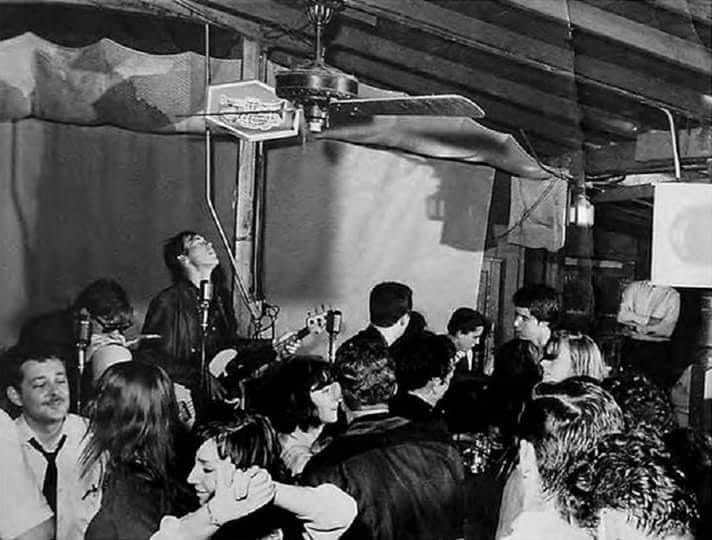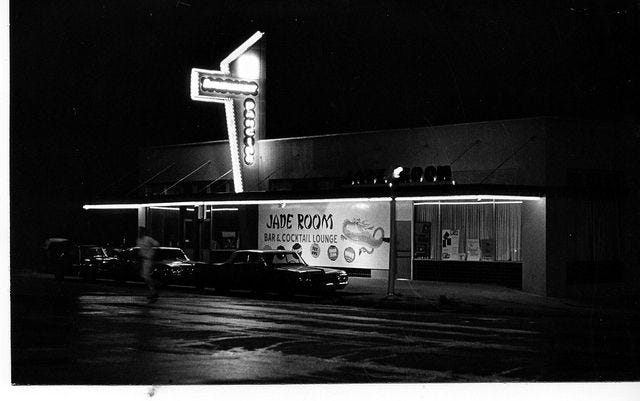Two clubs on San Jacinto Street defined the range of rock music Austin music in the mid-’60s. The Jade Room, which had a strict dress code, was at 1501 San Jacinto Street. At 1809 San Jacinto, later home to Club Saracen, was psychedelic rock club Fred, which was shut down in late ‘66 after being caught serving to a minor.
“Being unkempt was part of the scene at this club,” former Conqueroo drummer Gerry Storm wrote of Fred in his self-published history of Austin music in the ‘60’s. “Performers from Fred did not play at The Jade Room nor vice-versa. But there was talent at both places.”
That talent combusted to form the 13th Floor Elevators in Dec. 1965, when former folkies the Lingsmen convinced dynamic rock singer Roky Erickson to leave his rising band of fellow Travis High students and throw in with them for a trippy, heady new sound.
Doc and Marge Funk opened the original Jade Room on the Drag (2514 Guadalupe St.) in 1955 with the Benny Ray Trio playing cocktail jazz. The Funks also owned the Flamingo Lounge at 3709 Lake Austin Blvd. with a similar Vegas lounge format. The Jade moved to the southeast side of campus in 1962 and hired “6-piece colored combo” the Rhythm Kings to play dance music for the college kids on weekends. Weeknights were usually filled with jazz trios or cheesy vocal groups like the Four Maldehydes.
Doc Funk died of a heart attack in 1964, so he didn’t witness the club’s rock n’ roll heyday, which Marge ruled in a manner that earned her the “Dragon Lady” nickname. (Went with the club’s decor.) “Marge was right out of central casting,” said John Inmon, who played the club with his first Austin band, the Reasons Why. “She had red hair and a harsh voice.” Roky and the Spades packed the place every Wednesday and Thursday night for much of ‘65, their draw helped by KNOW-AM playing their first single, “You’re Gonna Miss Me” b/w “We Sell Soul.” The Spades (named after a suit of playing cards) also played Le Lollipop, a short-lived, Shindig-inspired club on Riverside.
Roy Head and the Traits, originally from San Marcos, were the biggest thing in town when they played Swingers A-Go-Go (later the Action Club) near North Loop, but the Spades looked to be the next big thing.
They had a big supporter in Statesman “Nightbeat” columnist Jim Langdon, who reported in Oct. 1965, that Roky had been kicked out of Travis for refusing to cut his hair. “Pity poor Samson had he tried to get through Travis High without a haircut,” Langdon wrote. As you can see from this 1965 photo, none of the other Spades had long hair, though drummer John Kearney was getting there.
The Fred, formerly Library Lounge, was part of Bill Simonson’s portfolio of clubs, including the id coffeehouse at 407 W. 24th St. and the 11th Door on Red River, where Lightnin’ Hopkins once played 10 nights in a row in ‘66. Can’t forget the weekly “folk sings” at the Texas Union that sprung Janis in ‘62. The id didn’t serve beer, so it stayed open all night and hosted after-hours jazz jams usually run by experimental accordion player Bob Sardo, with Fred Smith on sax and drummer Leotis Duffy as regulars.
Simonson also had the Match Box rock club in West Campus and the Pleasure Dome on Sixth Street, but he didn’t really make any money until he moved to Dallas and opened Mother Blues in 1971.

While the Spades were rockin’ out at the Jade, the Lingsmen were a former skiffle group consisting of guitarist Stacey Sutherland and drummer John Ike Walton, both from Kerrville, and Austin bassist Benny Thurman. Skiffle had been popularized by British singer Lonnie Donegan, who sped-up Lead Belly’s “Rock Island Line,” added washboard for rhythm, and influenced an entire generation of British musicians, including those guys from Liverpool. But it never caught on in the States. The Lingsmen started transitioning into a rock band after manager Tommy Hall saw Bob Dylan go electric at the Municipal Auditorium in Sept. 1965.
They needed someone who could wail over the big noise they were creating. And there was Roky just down the street.
Originally from Houston, Hall was a born huckster and philosopher who sold Erickson on musical mind expansion in the last year LSD was legal. “Tommy wanted to get everyone high,” Roky’s mother Evelyn said in 2010. “Well, Roky was already (naturally) high.”
Erickson was impressed with Sutherland’s guitar-playing, which sounded perfect for an acid trip, especially paired with the waves of sound Hall created blowing on top of an amplified jug.
Erickson was the star, Austin’s golden child, so the band was originally called Roky and the Elevators. Hall’s wife Clementine, who wrote mystical lyrics for the group, came up with the “13th Floor.” That set them apart from the ‘60s frat party bands, including Babycakes, Sweetarts, the Chevelles and the Wigs.

The Elevators took over where the Spades left off, packing the Jade on their first gig Dec. 8, 1965, and continuing to draw 400 fans every Tuesday and Wednesday night.
January 1966 was a big month for the band, who went to Houston to record their first single, “You’re Gonna Miss Me” b/w “Tried to Hide” for Gordon Bynum’s Contact Records. They also recorded their first drug bust, with every member but bassist Thurman getting popped for two pounds of marijuana at Hall’s house at 403 E. 38th Street. “Turn On Tommy” had been under surveillance for a month. The ages of those arrested ranged from Roky, 18, to Clementine, 26.
When “You’re Gonna Miss Me” came out in February, it sold well, but KNOW, the big Top 40 station in town, wouldn’t play it. D.J. Lou House said he made that call because he was annoyed that the band and their friends were flooding the request line. No local single could be that popular.
But the banning could’ve been due to pressure from advertisers and Austin establishment after the drug bust. Hippies were not to be encouraged in the land of LBJ, whose escalation of the Vietnam War made him the most hated man in America.
The Elevators moved their live show from the Jade to the the looser, bigger New Orleans Club on Red River, which had no dress code. But being out on bail kept them home in Austin until late ‘66 when they were finally able to tour the West Coast.
Former Vulcan partner Houston White and Wigs guitarist Benny Rowe were living in the Bay Area when the Elevators came to town on the strength of debut LP The Psychedelic Sounds of the 13th Floor Elevators. “They blew away all the famous San Francisco bands,” said White. “Nobody wanted to follow them because nobody could.”
Lavender Hill Express became the hottest rock band in town after the Elevators left. Singing drummer Rusty Wier (ex-Wig), bassist Gary P. Nunn, and guitarists Layton DePenning and Leonard Arnold were a cover band that played the Beatles, Sam & Dave, James Brown and a few originals to packed houses every Thurday night at the Jade.
The club paid the bands what they could bring in at the door, which wasn’t much most nights, so the local musicians union had their members boycott the club until Funk could guarantee $35 per musician, per night. That killed the Jade in 1972.
The other notorious clubowner on San Jacinto was Marie Nohra at Club Saracen (1809 San Jacinto) who was known for stiffing bands, but paying agents’ commissions so they’d keep booking them. Club Saracen moved to Lavaca Street across from the Texas Chili Parlor in ‘68, replaced on Jacinto by the Red Baron, where Greezy Wheels were the first true hippie country band in town.
Part 2 coming soon: The Elevators get stuck between floors, and Lavender Hill Express becomes the top band on the Austin scene.








